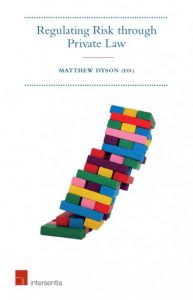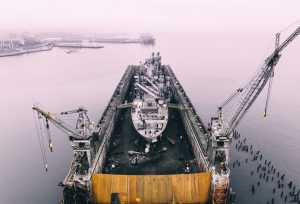 On the 20th of February, the volume Risk Regulation through Private Law, edited by Ucall-research fellow Matt Dyson, was launched at Oxford University. The volume explores, for nine legal systems, an overarching legal conception of risk, particularly of the linked role of a) risk-taking in generating liability and b) in liability regulating risk. It consists of two parts. Part I of the volume (Risk Overviews) deals with risk-based reasoning within those nine tort law systems and examines how risk influences the nature and content of tort law. Part II (State of the National Art on Risk) focuses on specific developments within the legal systems. Ivo Giesen, Elbert de Jong and Marlou Overheul wrote the Dutch chapter for part I. De Jong also wrote the Dutch chapter for part II, dealing with judicial risk regulation in e.g. the context of climate change, tobacco related risks, and air-quality standards (for more on that, see here and here). In this weblog we discuss the most important insights of the Dutch chapter in part I (see I. Giesen, E.R. de Jong & M. Overheul, ‘How Dutch Law Responds to Risks’, in: M. Dyson (ed.), Regulating Risk Through Private Law, Intersentia 2018, p. 165-193). Lees verder
On the 20th of February, the volume Risk Regulation through Private Law, edited by Ucall-research fellow Matt Dyson, was launched at Oxford University. The volume explores, for nine legal systems, an overarching legal conception of risk, particularly of the linked role of a) risk-taking in generating liability and b) in liability regulating risk. It consists of two parts. Part I of the volume (Risk Overviews) deals with risk-based reasoning within those nine tort law systems and examines how risk influences the nature and content of tort law. Part II (State of the National Art on Risk) focuses on specific developments within the legal systems. Ivo Giesen, Elbert de Jong and Marlou Overheul wrote the Dutch chapter for part I. De Jong also wrote the Dutch chapter for part II, dealing with judicial risk regulation in e.g. the context of climate change, tobacco related risks, and air-quality standards (for more on that, see here and here). In this weblog we discuss the most important insights of the Dutch chapter in part I (see I. Giesen, E.R. de Jong & M. Overheul, ‘How Dutch Law Responds to Risks’, in: M. Dyson (ed.), Regulating Risk Through Private Law, Intersentia 2018, p. 165-193). Lees verder
Maandelijks archief: februari 2018
Domestic criminal accountability for Dutch corporations profiting from North Korean forced labour
 I was recently invited as a legal expert to reflect on the potential for accountability of Dutch corporations profiting from the labour exploitation of North Korean workers abroad. Already in 2016, a team led by Remco Breuker, professor of Korean Studies at Leiden University, had issued a report detailing the appalling (forced) labour conditions in which North Koreans work in Europe. This happens in particular in Poland where they are forced to work on shipyards and have to hand most of their wages to the North Korean government. Apparently, North Korea ‘trafficks’ these workers to Poland for self-enrichment purposes. In the wake of this report, investigative work sponsored by the Why? Foundation exposed how various corporations and governments are complicit in these abuses (this work resulted in a documentary, Dollar Heroes, more information can be found here). On that basis, Breuker’s research team produced a follow-up report, released on 6 February 2018, which highlighted the involvement of Dutch corporations, notably as buyers of ships made by North Koreans in Poland. In this post, I explain on what grounds these corporations could be held to account under Dutch criminal law, and in particular how Dutch jurisdiction could be established over them. Lees verder
I was recently invited as a legal expert to reflect on the potential for accountability of Dutch corporations profiting from the labour exploitation of North Korean workers abroad. Already in 2016, a team led by Remco Breuker, professor of Korean Studies at Leiden University, had issued a report detailing the appalling (forced) labour conditions in which North Koreans work in Europe. This happens in particular in Poland where they are forced to work on shipyards and have to hand most of their wages to the North Korean government. Apparently, North Korea ‘trafficks’ these workers to Poland for self-enrichment purposes. In the wake of this report, investigative work sponsored by the Why? Foundation exposed how various corporations and governments are complicit in these abuses (this work resulted in a documentary, Dollar Heroes, more information can be found here). On that basis, Breuker’s research team produced a follow-up report, released on 6 February 2018, which highlighted the involvement of Dutch corporations, notably as buyers of ships made by North Koreans in Poland. In this post, I explain on what grounds these corporations could be held to account under Dutch criminal law, and in particular how Dutch jurisdiction could be established over them. Lees verder
Changing the Causation Requirement: its Impact on Defendant Companies
 The possible success for claimants of a (mass) tort claim against a defendant company often depends on the causation requirement in Article 6:162 or Article 6:74 Dutch Civil Code (hence: CC) being fulfilled or not. Traditionally, this was a useful legal instrument for defendants to have claims dismissed, thereby keeping the floodgates of liability shut. However, in our current globalizing world (multinational) companies are confronted with causation requirements that differ from country to country and even within countries, at least in the Netherlands, depending on the factual situation. In the Netherlands, as elsewhere (for a comparative overview: S. Steel, Proof of causation in tort law, Cambridge University Press 2015), the traditional requirement of condicio sine qua non (CSQN) to establish liability has been relaxed to a large degree, either from a substantive and/or from a procedural (evidential) angle, with case law making exceptions to the rule on a case by case basis, without there being a generally applicable justification that firmly underpins these exceptions. Since there is as yet no ‘one-size-fits-all EU causation’ either, a company that has its business in multiple European countries is faced with different types of causation requirements per country and within a country. This means that the causation requirement has lost a great deal of its attractiveness for i.e. businesses over the years. The aim of this Blogpost is to highlight the possible consequences of the lack of a general justification for many of the individual changes (i.e. relaxations) in the causation requirement that facilitate the establishment of liability under Dutch tort law in our modern day and age. Lees verder
The possible success for claimants of a (mass) tort claim against a defendant company often depends on the causation requirement in Article 6:162 or Article 6:74 Dutch Civil Code (hence: CC) being fulfilled or not. Traditionally, this was a useful legal instrument for defendants to have claims dismissed, thereby keeping the floodgates of liability shut. However, in our current globalizing world (multinational) companies are confronted with causation requirements that differ from country to country and even within countries, at least in the Netherlands, depending on the factual situation. In the Netherlands, as elsewhere (for a comparative overview: S. Steel, Proof of causation in tort law, Cambridge University Press 2015), the traditional requirement of condicio sine qua non (CSQN) to establish liability has been relaxed to a large degree, either from a substantive and/or from a procedural (evidential) angle, with case law making exceptions to the rule on a case by case basis, without there being a generally applicable justification that firmly underpins these exceptions. Since there is as yet no ‘one-size-fits-all EU causation’ either, a company that has its business in multiple European countries is faced with different types of causation requirements per country and within a country. This means that the causation requirement has lost a great deal of its attractiveness for i.e. businesses over the years. The aim of this Blogpost is to highlight the possible consequences of the lack of a general justification for many of the individual changes (i.e. relaxations) in the causation requirement that facilitate the establishment of liability under Dutch tort law in our modern day and age. Lees verder
Verplichtingen van bedrijven bij klimaatverandering
 Op dinsdag 23 januari 2018 werden, in navolging van de presentatie op 18 januari in Amsterdam, de ‘Principles on Climate Obligations of Enterprises’ (hierna: principles) gepresenteerd in Londen. De principles zijn een follow-up van de Oslo-principles die de verplichtingen van staten ten aanzien van klimaatverandering in kaart brengen, waarover Giesen reeds een blog schreef. De principles zijn opgesteld door ‘the Expert Group on Climate Obligations of Enterprises’, bestaande uit experts op het gebied van het internationale recht, het aansprakelijkheidsrecht, het milieurecht, het ondernemingsrecht en mensenrechten. Het project is geïnitieerd door Jaap Spier. Hij stelde tevens de principles en het daarbij behorende commentaar op. Deze blog behandelt het doel van de principles, de belangrijkste verplichtingen en hun juridische status en legitimiteit. Voor een meer gedetailleerde verhandeling van deze en andere thema’s wordt het lezen van de principles, die open access zijn gepubliceerd, van harte aanbevolen. Lees verder
Op dinsdag 23 januari 2018 werden, in navolging van de presentatie op 18 januari in Amsterdam, de ‘Principles on Climate Obligations of Enterprises’ (hierna: principles) gepresenteerd in Londen. De principles zijn een follow-up van de Oslo-principles die de verplichtingen van staten ten aanzien van klimaatverandering in kaart brengen, waarover Giesen reeds een blog schreef. De principles zijn opgesteld door ‘the Expert Group on Climate Obligations of Enterprises’, bestaande uit experts op het gebied van het internationale recht, het aansprakelijkheidsrecht, het milieurecht, het ondernemingsrecht en mensenrechten. Het project is geïnitieerd door Jaap Spier. Hij stelde tevens de principles en het daarbij behorende commentaar op. Deze blog behandelt het doel van de principles, de belangrijkste verplichtingen en hun juridische status en legitimiteit. Voor een meer gedetailleerde verhandeling van deze en andere thema’s wordt het lezen van de principles, die open access zijn gepubliceerd, van harte aanbevolen. Lees verder

